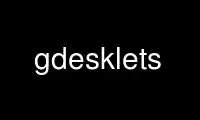
This is the command gdesklets that can be run in the OnWorks free hosting provider using one of our multiple free online workstations such as Ubuntu Online, Fedora Online, Windows online emulator or MAC OS online emulator
PROGRAM:
NAME
gDesklets - provides an advanced architecture for desktop applets
SYNOPSIS
gdesklets open [ display ]
DESCRIPTION
gDesklets provides an advanced architecture for desktop applets -- tiny displays sitting
on your desktop in a symbiotic relationship of eye candy and usefulness.
Populate your desktop with status meters, icon bars, weather sensors, news tickers...
whatever you can imagine! Virtually anything is possible and maybe even available some
day.
FIRST START
You can find an entry in the GNOME menu after a successful installation. This will start
the gDesklets Shell where you can install and run desktop applets. When you log out or
quit 'gDesklets', the settings will be remembered for the next session.
COMMAND LINE TOOL
The command line tool gdesklets lets you perform all administration tasks from the command
line.
Display files can be opened using
$ gdesklets open <displayfile>
If the gdesklets-daemon wasn't running, this will start up the daemon as well. You can
only have one daemon per X-display. The daemon can be stopped again by calling
$ gdesklets stop
Usage of the command line frontend:
gdesklets [option] <command> [arguments...]
<command>: open <files> (Opens the given display files)
start (Runs the gDesklets daemon)
stop (Stops the gDesklets daemon)
list (Lists open displays)
restart (Restarts the gDesklets daemon)
profile <profile> (Switches to the given profile)
profile (Shows the current and the available
profiles)
shell (Opens the graphical shell)
slay (Kills the daemon -- use in emergency)
status (Checks daemon status)
about (Prints information about gDesklets)
version (Prints gDesklets version)
configure (Opens the configuration dialog)
help (Displays this text)
check (Dependency check for python bindings)
[option]: --no-tray-icon (disables the systray icon)
If you don't pass a command, the script will fall back to
gdesklets start which is the default.
GDESKLETS-SHELL
The shell is a graphical frontend for managing your desklets. You can start it either by
selecting it from the GNOME menu (Accessories -> gDesklets), by selecting it from the tray
icon popup menu, or by calling:
$ gdesklets shell
The shell currently lets you create and switch between profiles, install new desklets and
search for desklets. New desklets can be installed by dragging links from your web browser
or files from the file manager into its window, or by selecting the menu item "File ->
Install package...".
Displays (as we call the applets) will usually appear in the top left corner of your
screen when you first run them. You can move displays around by pressing and holding down
the middle mouse button. 'gDesklets' will remember the new position of the display for the
future.
USAGE
If you press the right mouse button over a display, a popup menu will open. It depends on
the display what you will see there, but the following items are always available:
Configure desklet
Opens the configuration dialog for this display. It depends on the display what you
can configure.
Move desklet
Attaches desklet to cursor for moving it around. Click to release it.
View Source
Lets you view the desklet's source file (.display).
Restart desklet
Restarts this display. This menu item is mainly for sensor debugging.
Remove desklet
Removes this display from your desktop.
About
Lets you view desklet's "About" information, license and readme file.
LOGFILE
The gdesklets-daemon writes a log file. That file can be found in
~/.gdesklets/logs/gdesklets<display>.log where <display> is the name of the X-Display.
You can select the item View log in the popup menu of the tray icon to view the log
messages.
SUPPORTED WINDOW MANAGERS
In order to run on as many desktops as possible, gDesklets relies on the EWMH
specification from freedesktop.org. This specification is respected among many window
managers. We currently know of the following EWMH compliant window managers:
* metacity
* xfwm4
* openbox
* enlightenment (>= 0.16.6)
* fvwm (2.5.x, see http://www.fvwm.org/features.php)
* sawfish
* kwin
* evilwm
* fluxbox (recent versions)
* waimea
* ...and certainly some others which we forgot here.
MEMORY CONSUMPTION
This is taken seriously. In every release we're addressing these issues. Unfortunately,
gDesklets is relying on libraries which contain their own bugs or leaks. In some places
it's possible to create a work-around. Sometimes, we
have to wait until an issue in bugzilla is fixed. gDesklets itself shouldn't leak. We've
checked the relevant C code to make sure of that.
At startup the program claims approximately 16 MB of RAM. In the future we're going to
decrease that number. Some people in the GNOME and GTK+ community are also addressing
these problems at a lower level (gtk+ and gnome libraries). gDesklets will automatically
benefit from these efforts.
COMMUNITY
The site 'http://www.gdesklets.de' is the place where you can get new desklets or upload
your own creations for sharing them with other users.
Discussion and Help http://mail.gnome.org/mailman/listinfo/gdesklets-list
gDesklets Developer's Book (for developing on the gDesklets platform)
http://develbook.gdesklets.de
A printed reference in German language is available from 'Software & Support Verlag GmbH'.
The book 'Exploring Python' covers desklet development on 34 pages.
You can meet the 'gDesklets' developers and other fans on the IRC channel #gdesklets on
GIMPnet (irc.gimp.org).
Use gdesklets online using onworks.net services
